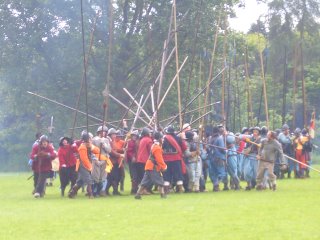
 |
|
Monday, June 26, 2006
Australia out of World Cup Unfortunately Australia has been beaten by a bad reffing decision and is out of the World Cup. Italy won with a last minute penalty shot ending an exciting game with a disappointing anti-climax. This tops off a bad week in football - first was the embarrassment of the Australia v Croatia game which turned into a farce then South Korea's failure to get into the second round when the lines man's flag was overruled. The ref's decision to overrule was above board and Korea knows to play by the whistle but it did all happen very quickly and it left a bad feeling. So with Korea and Australia both out in rather disappointing circumstances I probably won't bother watching the rest of the tournament. Given that four years ago the reffing was terrible and this year it is still terrible I can only hope it improves between now and 2010.
Permalink Post a Comment
Friday, June 16, 2006
Panel III. The R.O.K.'s Self-Reliant Military Policy and the CFC: Replacing the Armistice Below are the summaries for Session III of the Brookings Seoul-Washington Forum. Kim Dong Shin Former Minister of Defense, Republic of Korea Meeting Challenges in Transforming the Alliance Prudently This article focuses on the challenges to changing the nature of the security alliance. It examines both the possible reduction and repositioning of US forces as well as the possibility of increased role and responsibility of South Korean forces in the defence of the peninsula. The main policy recommendation for this is to establish a political advisory council to create new values for the alliance. He argues that there needs to be more done to create mutual agreement on what the alliance is trying to achieve and how this can done in order to avoid rifts and distractions such as the death of the two school girls and the mess it created for the alliance because it separated US and South Korea in enemy camps rather than being something they needed to handle together. Deterrence and defense need to be supplemented by a new vision of peaceful coexistence and peaceful unification of the Korean Peninsula. Devaluing and mistrusting the alliance should end in Seoul, while impatience and anger about South Korean new elite and questions raised by them should end in Washington. Therefore, the two countries need to begin two plus two dialogue between Defense Minister and Foreign Minister of the Korean side and Secretary of Defense and Secretary of State on the US sideThe body of the paper is rather dull but it ends strongly with a clear conclusion and by emphasizing the need for public diplomacy on both sides to educate the public on what the alliance is there for and why it is important. I think this is the first paper that has actually outlined steps that both sides can be taking to strengthen the alliance. John Tilelli, Jr. Chairman and Chief Executive Officer, Cypress International Inc. and Former Commander-in-Chief United Nations Command, US-ROK Combined Forces Command This is a transcript taken from the presentation implying that he did not prepare a paper and spoke with only talking points. Tilelli mainly discusses the idea of when OPCON for ROK forces will be given back to Korea. In this he focuses on how and why that decision should be made arguing that rather than being event-driven it should be time-lined with clear ideas on what capabilities need to be identified in the ROK to know that it is the time to make the change. This means money/investment, C4ISR(command, control, computers, communication, intelligence, surveillance and reconnaissance) modernization, and agreeing on the role of the US forces. He also talks about how such a move will alter the dynamics of the US-ROK relationship indicating that US forces would move to a supporting role to the ROK command. Hamm Taik-Young Professor of Political Science, Kyungnam University The Self-reliant National Defense of South Korea and the Future of the US-ROK Alliance Self-reliance depends on more than just military build-up according to this article. Looking back South Korea has long aspired to be self-reliant from certain points of view but in reality it has not set out the necessary path needed to allow for South Korea to become a fully self-reliant military power capable of defending its nations interests, be that against North Korea or a different threat that may arise in the future. the reform requires indigenous strategic planning and possibly a future defense posture without the USFK. Arms build-ups themselves are not an answer to the call for self-reliance. While South Korea has embraced the goal of self-reliant defence for more than three decades, the dependent mentality in national security has not changed considerably. The foundation of self-reliance is the consciousness of autonomy, responsibility, creativity for a long-term vision, and a wider consensus of and support from the people.He then goes on to discuss broader implications of ROK self-reliance and the need for a broader peace regime in North East Asia to avoid an arm's race. He rejects the idea of Korea as a neutral or buffer country between US and China or Japan and China and stresses instead multilateral security cooperation to avoid polarization between US and China or Japan and China, which could leave Korea uncomfortably positioned. Bruce Bechtol, Jr. Associate Professor of International Relations, United States Marine Corps Command and Staff College Planning for Change in the ROK-US Alliance: Challenges and Implications Bechtol outlines two key challenges in Korea's plan to gain 'independent capability' in defense by 2020; finance and transformation. In finance he is concerned that Korea has not clearly outlined how they will guarantee the necessary increase in the defense budget from President to President. In discussing the transformation he makes similar comments to the previous paper that self-reliance requires a shift form having complimentary capabilities to the US to developing capabilities and an outlook on defense which it currently doesn't really have. That is to say that rather than build up weapons Korea needs to be able to take over intelligence and other skilled areas currently handled by the US forces. The question that was not adequately answered for me in this paper was: does South Korea need to be as strong as the US to be considered ready to defend itself against North Korea? All the comparisons were against what the US has in terms of capability and I think we all agree that US outclasses North Korea well beyond a level needed to deter or defeat North Korea. And also, does South Korea need to have everything it needs before it can be seen capable of defending itself or can it be a more gradual process with South Korea getting to a minimal level and then building more capability on a long-term time-line. In all, even though it is prudent to discuss openly the challenges facing both South Korea, the US and the alliance in the event of Korea taking OPCON, I felt the analysis was too pessimistic and short on practical solutions. Monday, June 12, 2006
3-1 Australia won against Japan by 3 goals to 1!! We scored all three goals in the final 11 minutes of the game which was a bit hair-raising for us spectators but the result is what counts. We are AWESOME. Sunday, June 11, 2006
World Cup 2006 The World Cup has started. It harldy seems like four years since I was in Korea for the occasion. This time around though Australia is playing. (Hooray!) It is also good because Australia has hired former South Korean coach Gus Hiddink. Of course that does not guarantee that Australia will do as well as Korea did but I like Gus, I think he's a good coach who cares about his players. It doesn't matter much how Australia does this time round. The point is that we made it to the World Cup and I expect our team will make more regular appearances from now on. I think there is a tendency in Australia to believe that we are the greatest sporting nation. It doesnt fit that we haven't won the World Cup but the growing popularity of the game in Australia might be the start of great things to come. This is just the beginning. Australia plays its first match (against Japan) tomorrow. Korea will play Togo for its first game the following day (June 13). Saturday, June 10, 2006
More on the Seoul - Washington Forum I have now summarised Session II. The Six-Party Talks: Moving Forward of the Seoul - Washington Forum held in Washington DC in early May. From the papers I am judging this was quite a corker of a session with speakers having polarised views on the six-party talks and what should be happening. This summary of papers also concludes day one of the two-day conference - half way! Session II - The Six-Party Talks: Moving Forward Chang Sun-Sup Chairman of the Executive Board, Korean Peninsula Energy Development Organization The Unfinished Project: The Significance of the LWR Project The title pretty much gives the argument away as the author outlines a history of the decline of the project and why it is important that it not be left to die. In the historical review, while not laying blame, he favours the perspective that North Korea, US and Japan were happy to let KEDO dwindle while South Korea fought valiantly for its survival. The trio of countries did not let it flounder without cause however, and he runs through events that prompted these countries to withdrawal their support. In the US, the lack of North Korean cooperation and announcement by North Korea of their HEU program was pretty much an end to their support, while for Japan the whole 1998 test missile and abductees issue curbed their enthusiasm. He goes on to point out that good things have come from the LWR project despite its failure. The interaction between South and North Korean workers and North Korea's exposure to South Korean technology is viewed as a plus regardless of the projects ultimate lack of progress. And that given the work already done and the impasse in the current six-party talks there may yet be a way for the LWR project to be resuscitated. The weakness of the paper is in the lack of footnotes or supporting information that would more directly show how South Korea struggled to keep KEDO alive as the US and Japan were withdrawing. Speaking as someone from KEDO who has direct involvement in the project, I think, does give him some freedom to explain events from his own view in the thick of things rather than relying on other sources, but not in explaining how fluctuations in the international political environment influenced, and was affected by, policy changes. David Asher Adjunct Research Staff Member, Institute for Defense Analyses The Illicit Activities of the Kim Jong-Il Regime This paper covers the illicit activities of counterfeit currency, drug smuggling, weapons trade, and smuggling of sanctioned items. There is quite a bit of interesting information about North Korea's (alleged) illicit activities in these different areas, especially the Royal Charm operation. To combat these threats, the US adopted the Illicit Activities Operation (IAI), which sounds like the policy to curb and intercept suspected DPRK trades/smuggling. The argument being that these efforts run parallel (and complement?) the six-party talks by showing the DPRK that US won't stand for such nonsense. The paper ends with some policy implications for the US: a) continue the IAI crackdown on DPRK's illicit activities; b) closer monitoring and interception where necessary of DPRK boats to prevent proliferation and weapons sales; c) strong law enforcement against DPRK should strangle their economy and make them more pliable; so incentives should not be aimed at propping at the existing dodgey economy; d) DPRK should shift direction toward a 'bold switchover' and e) US should be ready to provide full support to assist North Korea's new approach. Although it is not very clear I think the argument is that the Six-party talks must work in within a broader framework of dealing with North Korea, which includes strict law enforcement of illicit activities. In the paper the six-party talks are not really mentioned which is disappointing given the topic of the session. I also think that policy implication (d) is not for the US and should not have been mentioned in that context. And the question remains: can a crack-down on illicit activities work in parallel with the six-party talks; is the impact negative, positive or neutral. This paper clearly saw it as positive. Paik Haksoon Director of Inter-Korean Relations Studies Program, The Sejong Institute; Executive Director, Seoul-Washington Forum What is to be done for the North Korean Nuclear Resolution? This is a rather provocative paper. The main assessment seems to be figuring out who is to blame for the current lack of progress. The blame rests squarely on the US while poor South Korea is seen as the one who clearly has the most to lose by a nuclear North Korea: Other six-party talks participant states appear to have been disillusioned by now at the lack of United States' political will, ability, and leadership in achieving nonproliferation of North Korean nuclear weapons and weapons programs. They are questioning the assumption of the U.S. policy that joint pressure on North Korea will make North Korea give in and the validity of the U.S. judgment that the reason North Korea has not surrendered until now is just because there has not been enough pressure on North Korea in one coherent voice. South Korea and China demand that the United States exercise flexibility. They are asking where U.S. leadership is.He sees that US inflexibility limits the options available to the parties to induce North Korea to freeze, or dismantle, their nuclear program. He clearly sees the sanctions as being negative. In noting the joint statement in late 2005, the author blames sanctions (probably that whole IAI thing) as squandering any progress made on the diplomatic front. The way forward is to find incentives that will get North Korea to cooperate, not to wear them down. The idea of collectively putting pressure on North Korea is viewed as a bad one. He argues that while the US calls for more pressure and more time for the pressure to take effect on North Korea they have more time to build up their weapon’s programme. In a bit of switch, the US is seen as being the country adopting a muddle-through policy and as being too burdened by ideological constraints: [A] problem associated with the United States' muddling-through policy applied to the North Korean nuclear problem when it is pursued in the absence of any effective problem-solving means has to do with the fact that the neoconservatives and ultra rights in Washington, D.C. are disproportionately under the heavy influence of their ideological and philosophical thrust and impulse in dealing with the practical policy issues. This ideology-laden policy making does not help them fully grasp the fundamentals of how real politics and policy making are conducted in the North Korean political system. The U.S. policy toward North Korea in the North Korean nuclear problem is a case of an excess of ideology and ignorance combined.He concludes by offering some policy recommendations: a) provide North Korea with security assurances and think more seriously about a policy that includes carrots instead of only sticks; b) US should engage in bi-lateral talks with DPRK either separate or within the six-party framework; c) North Korea should be offered a freeze option immediately; d) There should be more South-North Summits and US-North Summits; e) South Korea should seek to engage in bi-lateral talks with the North on the nuclear issue unless US can start to show more flexibility; f) South Korea and US should state clearly their policy goals vis-a-vis North Korea and if they are not a match, they should pursue their separate paths. Just as an aside, in the article he describes James Kelly's visit to North Korea as POMPOUS. Its comments and words like that that makes reading these papers so worthwhile. I know what that word means but I have no idea its purpose in this context. If I was Kelly I’d be flattered. Leon Sigal Director of the Northeast Asia Cooperative Security Project, Social Science Research Council An Instinct for the Capillaries This paper, also provocative, sees the US policy as misguided and useless. Like the previous paper he advocates bi-lateral discussions and views the sanctions are negative. He argues that the profits from illicit activities are exaggerated and that the increase in trade from South Korea and China is further diminishing its overall worth to the regime. Therefore, the main work of the IAI is to prevent any success through negotiations rather than to squeeze the North. He also argues strongly against the US hardline policy advocating no bi-lateral interaction with North Korea. For five years [the US] have huffed and puffed but failed to blow Kim Jong-il's house down. Instead, all their hot air has succeeded only in thawing North Korea's frozen plutonium program.He blames hardliners in the US for taking options and, like the previous paper, recommend that the US first settle for a freeze before trying to make further progress. Sunday, June 04, 2006
English Civil War Re-enactment - Longford Hall Last weekend I joined the English Civil War Society in Newport, Shropshire. The event was held on the grounds of Longford Hall, which is now a part of a school. This was a major muster so there were plenty of groups from both the Parliamentarian and Royal sides. I was part of the Earl of Essex Regiment and they are easily spotted by their orange coats (as the photos will reveal). It has been many years since I've been camping and my first time to camp in UK. Needless to say I spent most of the weekend in multiple layers of clothing grumbling about the cold. I was particularly annoyed by the British people who insisted on parading around in t-shirts and sandals. Fortunately the weekend featured plenty of beer and port to keep the spirit warm. On the first day of the muster I joined in as a pikeman. The pike is a horribly heavy weapon, especially when you are a weak and scrawny like me. I spent the morning with my Ensign going through some basic commands and proper handling of the pike. In the afternoon I joined the regiment in the battle re-enactment. However, I was too sore and sorry for myself to repeat the effort the next day. I opted to take some pictures:  This is a cannon. This is a cannon. Musketeers from the Royalist army. Musketeers from the Royalist army. An intense battle between opposing pike blocks from the royalist and parliamentarian armies. An intense battle between opposing pike blocks from the royalist and parliamentarian armies. The musketeers from the Essex regiment leaves the battlefield The musketeers from the Essex regiment leaves the battlefield
Luncheon Address by the Honorable James Kelly, former Assistant Secretary of State for East Asian and Pacific Affairs This post follows on from the previous summary of session one from the Seoul-Washington Forum held at the Brookings Institute May 1-2, 2006. The transcript from Kelly's luncheon address is based on a tape-recording. This would indicate that his talk was based off a few talking points rather than from a prepared speech. Accordingly, it lacks something in structure but the main topic is North Korea’s nuclear weapons program. Not surprisingly he adamantly opposes acceptance of North Korea as a nuclear power. We do not and must not accept North Korean nuclear weapons, even if there will be no quick solutions.He goes on to stress the unattractiveness of any military solution and advocates diplomacy as the way forward. He emphasizes that no solution can be reached without active participation of South Korea arguing that it is the country with most interested in what happens with North Korea. He sees some positive signs in how things are proceeding more generally in North Korea. He notes an increase in business relations, civilian and military, between China and North Korea. He also sees the on-going dialogue between South and North Korea as being broadly positive. However he does caution that South Korea's eagerness to be friendly with North Korea does not always lead to prudent moves. This comment is in relation to political payments the South has made to North Korea such as for the 2001 Summit meeting. He states: South Korea is understandably reluctant to have tensions rise, if only for the blow that that would be to its life and economy. But it needs to be firm and patient with North Korea. Sometimes it seems that Seoul lets its desire for peaceful comity get a little ahead of the situation the ground.He concludes his speech by expressing that US-ROK relations stand to benefit from an FTA but that it remains to be seen how the negotiations for that will pan out. The transcript also includes the Q&A session that followed Kelly's talk. The first couple of questions focus on the difference between regime change and regime transformation with Kelly (rightly) pointing out that transformation would be for the existing leaders to initiate reforms while regime change would involve changing the leadership. Don Oberdorfer asks about US reluctance to talk directly to the DPRK but Kelly reflects this by emphasising that US does talk to the DPRK and anyway, multilateral talks are better than bi-lateral. Other questions focus on US-ROK relations and US-DPRK relations from the viewpoint of US foreign policy toward each of these countries. The final question asks whether the US should have an opinion on Dokdo and Kelly (rightly) reiterated what Michael Green (see session one summary) had said that the US should stand clear and not have any opinion about what is a bi-lateral dispute. Saturday, June 03, 2006
Birthday Trip to Brighton As mentioned earlier, for my recent birthday I made a trip down to Brighton. Unfortunately it was the most miserable day weather-wise that we had encountered in a long while. This meant that there was little point to take many photos. As you can see below I decided the day was so colourless that I took the two scenery pictures in black and white to better catch the mood.  This is a picture of the Pavilion, which is the awesome summer palace of the Prince Regent. After visiting the Pavilion we stopped by the museum to see an exhibition of Rex Whistler works. This was way better than I had expected and well worth seeing.  And this is the Brighton Pier - the one that burned down. Looking all grey and miserable in the bleak weather. The other pier which is not burned down is full of rides and food stalls and has a large arcade for games. It was in the arcade that I decided to try that game where the claw tries to pick up a toy. I always figured these were rigged but I won on my first go; a big floppy-eared soft-toy rabbit.  For any Australian I think one of the key highlights of Brighton is going to be the pebble beach. I found it fascinating and if it hadn't been blowing a gale I would've spent more time just staring at it.  In all it was a pretty good way to spend a birthday and obviously the day finished at the pub with a few celebratory beers. Seoul-Washington Forum A Seoul-Washington Forum was held at the beginning of May at the Brookings Institute. The website has put up the papers, which make for an interesting read, from this event. The issues covered are the US-ROK Alliance, the Six-party Talks, military self-reliance in the ROK, and US-ROK economic cooperation. So far I have only summarised the papers from session one. There are three other sessions and two luncheon addresses (one for each day) by James Kelly and Christopher Hill respectively. Your options from here are to: a) read session one' s summary below and then wait and see if I get around to summarising the rest of the papers; b) forget about waiting and go and read them yourself; or c) just don't bother at all about any of it. Michael Green, "The Case for the US-ROK Alliance" This paper distinguishes between 'objective realities' of the US-ROK alliance and 'constructed realities' of the alliance. The three main areas of dispute in the alliance within the objective versus constructed realities framework are: a) divergence over North Korea; b) divergence over Japan and China; and c) divergence over command relationships and leadership in alliance. The objective realities assess the accomplishments of the alliance to date and views the state of the alliance from the perspective that all alliances undergo change to suit evolving circumstances and that there may be rough as well as good times in any alliance. From this perspective the US-ROK alliance is similar to most alliances and possibly better than some. However, the constructed objective considers how the alliance is portrayed in media or by politicians and how it is subsequently viewed by the public. Obviously the constructed reality of the alliance is quite different to the objective reality. In the case of the US-ROK alliance you have South Korean politicians getting short-term political gain from bad-mouthing the alliance, you have the American politicians complaining about South Korean recalcitrance and you have the North Koreans over-emphasising the threat of the US to peace and security on the peninsula. In the conclusion he states: Reviewing the major sources of tension in the U.S.-ROK alliance relationship today, one is struck at how many of the problems are ideational or constructed in nature. The areas of divergence are not the result of a differentiation in the objective material security threats we each face. Rather, it is how those common threats are interpreted in each side's changing domestic political cultures, and particularly on the ROK side. The task for those in leadership is to articulate a future vision for the alliance based on a realistic assessment of the threats we face and an agenda that draws on our common values as democracies and our peoples' respective aspirations.His recommends some practical steps that the US might take in order to de-emphasis some of the constructed realities. These suggestions sounded quite practical to me and his assertion that US should stay well clear of any Japan-Korea diplomatic disputes, whether it be Yasukuni Shrine or Dokdo, were right on the mark. And coming in at only nine pages, this is a concise article that is easy to read. Park Kun Young, "A Future of US-Korea Alliance: Toward a Mature Allied Partnership for Peace in Northeast Asia and Beyond" From the outset I didn't like this article. The purpose of the US-Korea alliance is poorly defined from the beginning. It follows that an essay giving policy prescriptions for an alliance, whose purpose is unclear, will lack focus or meaning. In the introduction it states that, the U.S.-Korea alliance has been a great success in terms of preventing a war on Korean peninsula and promoting economic development and democracy in Korea.The paper then says it will give policy recommendations that will allow the US-ROK alliance to lead peace in Northeast Asia and beyond. Preventing war and promoting economic development and democracy are not the same thing as leading regional and global peace. Although I am willing to be wrong, my understanding is the US-ROK alliance is a KASA i.e: Korea-America Security Alliance. Even though it could be argued that, providing a secure environment should allow for economic and political development, the US-ROK alliance does not expressly include economic or democratic growth as an objective. The alliance is a military one. It seems like the author is aligning the US-ROK alliance with 'the relationship between the US and South Korea'. This is not the case. And I certainly don't think that the US-ROK alliance has aims to 'lead peace' beyond Northeast Asia. The first prescription is to stabilize and strengthen the political relationship. The author argues that the blame for the current poor relationship rests with US and lists grievance going back as early as 1904, well before the alliance was even in existence. What I especially don't like here is the argument that the US should rush to rectify its image and better understand the root causes of anti-American sentiment in Korea if it hopes to have a positive relationship in Korea. I am not a huge fan of America but I think calling on America to placate public opinion in Korea is not what should be done here. Surely burden lies on the South Korean politicians to educate the South Korean public on why the alliance is good for their country. If nobody, neither the politicians nor the public sees any value in the alliance with America then it is time to cut the ties; not for America to do some PR. The second prescription is to address ambiguity in the Mutual Defense Treaty. Not knowing much about it, I have little comment. Except to say that this prescription, like the first one, appears to blame the US without analysing what steps South Korea should also be taking. The third suggestion is to expand the alliance into a multilateral regional peace arrangement. It seems odd to suggest this when the entire article has shown how difficult it is to have an agreement between two countries, let alone a whole bunch. The general ill-feeling between major regional powers in Northeast Asia, the fact that US already has an alliance with Japan and is unlikely to get one with China also negates the validity of this policy recommendation. Bruce Cumings, "Ending the ROK-US Alliance?" Although the topic was supposed to be about the possibly of ending the alliance, the article chooses to focus on why ending the alliance is almost inconceivable. This article gives a full account of issues in the US-ROK alliance focusing on events during the past decade. As most people know, Mr. Cumings tends not to favour US policy toward North Korea and South Korea. And this article is no exception. The US is portrayed as being mostly arrogant and ignorant in its policy toward both South and North Korea. Not surprisingly he sees the US as the main reason for the current strained relationship in the alliance. This article is similar in argument to the previous article in that it aims to demonstrate that strained relations are mostly the fault of the US' unilateral policy and attitude toward the North. Exacerbating this is the fact that the US policy is in contradiction to South Korea's own view on how North Korea should be handled. The divergent policies are fanning the rise of anti-Americanism in South Korea, which in turn i s weakening the alliance. Mr. Cumings' article however is better writtenargumentarguement is much more compelling than the previous paper. Moon Chung-In, "Re-thinking the Future of the ROK-US Alliance" This article tries to emphasise the continuing validity of the alliance. He points out that sentiment against US foreign policy should not mean that South Korea does not appreciate and respect the US. As he states: But it should be reminded that as in the U.S., South Korea is a pluralistic society and its people share diverse perceptions of the United States. Banmi (anti-American) is only one aspect of South Korea's national psyche, as there are, in fact, a variety of Korean positions toward the United States, ranging from chinmi (pro-American) and sungmi (worship America) to hyommi (loathing America). Those who attempted to tear down the MacArthur statue represent only a tiny segment of the Korean population. A great majority of Koreans still remember the U.S. role as a savior and remain grateful.He argues that the success/failure of the alliance should not be based on the recent protests in South Korea but judged on the achievements of the alliance. From this perspective, as the first article summarized also argued, the alliance is, and continues to be, a success. He also recognizes challenges to the future of that alliance including China and the dynamic nature of Asian politics and the rapid evolution of socio-economic circumstances in Asia. He also notes the command relationship and disputes over cost sharing, public perceptions in Korea of the US, and the divergent threat perception of North Korea. He concludes that any alliance should be seen as an instrument for enhancing national interest and the core problem would be if one or both nation can't see that value in the existing alliance.
|
Korea Blogs 
Newspapers |